Posted on 04/07/2021
2 min read
The health benefits of sport are well established. But this correlation is the result of several centuries of medical research. Already in Antiquity, the Greeks had realized the need to take care of one’s body in order to stay healthy.
“A healthy mind in a healthy body”. In the latest Sport-Health barometer published last February by the French Federation of Physical Education and Voluntary Gymnastics (FFEPGV) and Ipsos, 62% of French people consider that resuming physical and sporting activities is essential for themselves.
In his time, Hippocrates (460-377 BC) already made the same observation by asserting that “exercise is a factor of balance between the force which one expends and that which one absorbs”. For him, health comes from the balance between four elements: “blood, lymph, black bile and yellow bile”. This notion of balance between the elements is also found in Aristotle (384-322 BC) for whom “the work of the body harms the spirit, the work of the spirit harms the body”.
The intervention of medicine
The link between health and medicine appears for the first time under the Roman Empire thanks to Galen (130-199 AD). This doctor at the Pergamon Gladiators School incorporated the practice of gymnastics into preventive and therapeutic medicine. It differentiates the “active exercises” into three categories: those who require strength, those who require speed, and the violent. These notions then did not evolve until the Renaissance.
A link between breathing and physical activity
The Renaissance marks research through anatomy. When studying the human body, doctors gradually make the connection between breathing and muscular exercise. In 1780, Lavoisier demonstrated that “breathing is combustion” and demonstrates in the “Mémoires de l’Académie des Sciences, 1789-1790” that the more intense the physical activity, the more oxygen the body consumes. However, the muscular mechanism remains unknown to scientists at the time.
The birth of sports medicine
In France, sports activity entered classrooms in 1869 under the name of gymnastics. Its objectives are clear: to train soldiers, professionals, citizens, but also to stay in good health. This practice no longer leaves teaching. It was reinforced, first under the Vichy regime in 1940 before being the subject of numerous reforms. Sporting activity is first and foremost a public health issue in France, as demonstrated by the decree of October 2, 1945, which aims to guide athletes “rationally towards an activity of physical education and sport contributing to the development of their state of health and their balance in general “.
Medicine evolves and faculties offer courses “sports hygiene”. Hospitals are also adapting. In 1977, a medical department dedicated to high-level athletes was created within the National Institute of Sports and Physical Education (Insep). Since then, research on sport has continued to diversify, whether it is to increase the performance of athletes, but also to preserve the health of individuals.
.
dts7
